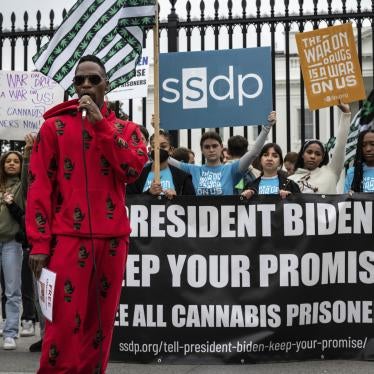Hopes are high that the U.S. Congress will do the right thing this year and reform notoriously harsh federal drug sentencing laws that have crammed U.S. prisons with small-time offenders.
The bipartisan Smarter Sentencing Act, approved by the Senate judiciary committee and now awaiting debate in the full Senate, would reduce federal mandatory minimum sentences for certain drug offenders, increase the number who can avoid them altogether, and permit prisoners serving time under outdated crack-cocaine sentencing laws to seek lower sentences. Passage would begin to reverse a decades-long trend that's seen "too many Americans go to too many prisons for far too long and for no good law enforcement reason," as Attorney General Eric Holder put it earlier this year.
Although legislators may not realize it, reduction of unduly severe sentences for drug offenders will help bring federal sentencing back in line with the long-overlooked principle of "parsimony." In the criminal justice context, parsimony dictates that sentences should be no greater than necessary to serve the legitimate goals of punishment, namely, retribution for past crimes, deterrence of future ones, and rehabilitation of the offender.
Congress once recognized the importance of parsimony. In the Sentencing Reform Act of 1984, it instructed federal judges to impose sentences that were “sufficient, but not greater than necessary” to advance the purposes of punishment. But starting in 1986, against a backdrop of social and economic turmoil, racial tension, and the advent of crack cocaine, Congress enacted mandatory minimum drug sentencing laws with stunning disregard for whether they would yield needlessly harsh sentences -- which they invariably did for the low-level offenders who made up the bulk of those recieving them.
Because Congress elected to key the minimum sentences to the quantity of a drug rather than the role or degree of culpability of the offender, they result in such obviously unfair outcomes. Take the case of Tyquan Midyett, a young man who was part of a group selling crack cocaine in a New York City public housing complex. Though he was found personally to have participated in the sale of, at most, 97 grams of crack, the group sold about eight times that amount, and he was sentenced in 2010 to 20 years in prison (based on a 10-year mandatory minimum “enhanced” with another 10 years due to a prior drug possession). The judge in his case described his sentence as “quite more than necessary," but didn't have discretion under the law to consider a lesser sentence.
Even worse, the laws authorize a mandatory life without parole sentence for low-level dealers with nothing more than low-level previous drug convictions,. Another example: Roy Lee Clay, a 48-year-old part-time home remodeler, was convicted of conspiring to distribute one kilogram or more of heroin, a crime that normally carries a 10-year sentence. However, Clay had two prior drug convictions and so he was sentenced to life without the possibility of parole. At his sentencing, in 2013, the judge called his sentence “extremely severe and harsh” but added that federal legislators had given her no other option.
What have thirty years of sentences like these accomplished? The number of federal prisoners has quintupled, and half of them are now drug offenders; and federal sentences are dramatically longer. Yet the drug business continues to thrive; illegal drugs are cheap and plentiful, the rate of drug use remains pretty steady, and for every drug offender sentenced to prison, another takes his place. The "Land of the Free" has become a nation behind bars, fuelling widespread doubts about the fairness and even the rationality of federal drug laws.
Opponents of the Smarter Sentencing Act, including some current and retired federal prosecutors, insist – without evidence – that the mandatory drug sentences are necessary to protect public safety. They also claim – and here the evidence is on their side – that the threat of high mandatory sentences helps convince defendants to plead guilty and cooperate with the government in exchange for lesser punishments. Because judges have no choice but to impose the mandatory minimums triggered by the charges prosecutors file, prosecutors can make good on the threat of higher sentences for those defendants who insist on going to trial: their sentences are on average three times longer than for those who plead. Not surprisingly, ninety-seven percent of drug defendants choose to plead guilty. Opponents of drug law reform seem to forget -- or don't care -- that the purposes of punishment do not include bludgeoning defendants into pleading.
Each year, hopes for federal drug sentencing reform are dashed by legislative inertia and a few powerful legislators who cling to outdated “tough on crime” notions. Perhaps this year will be different. A growing number of lawmakers, Republicans and Democrats, realize that lengthy mandatory minimum drug sentences are ineffective, wasteful, and expensive. And though few may use the term parsimony, many have come to understand that unnecessarily harsh sentences make a mockery of justice.
Fellner is a senior adviser with the U.S. program of Human Rights Watch, an international non-governmental organization advocating for human rights.







